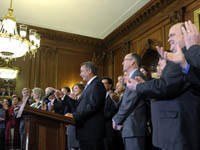Republicans agree to extend payroll tax for 160 million Americans
 Facing withering criticism from across the political spectrum and abandoned by Senate allies, House Republicans bowed to political reality Thursday and agreed to a two-month extension of a payroll tax cut for 160 million Americans. The agreement represented a remarkable capitulation on the part of House Republicans, who had two days earlier rejected such a deal with Democrats as the kind of half-measure that their new majority was elected to thwart.
Facing withering criticism from across the political spectrum and abandoned by Senate allies, House Republicans bowed to political reality Thursday and agreed to a two-month extension of a payroll tax cut for 160 million Americans. The agreement represented a remarkable capitulation on the part of House Republicans, who had two days earlier rejected such a deal with Democrats as the kind of half-measure that their new majority was elected to thwart.
And it amounts to a Christmas gift for President Obama, who attempted to paint his Republican opponents as willing to raise taxes for millions of Americans. Such an image could have cost the party politically just as it is gearing up to try to take back the White House and Senate in 2012, informs San Francisco Chronicle.
The agreement resolved the last stalemate in a year of bitter congressional fighting that earned lawmakers their lowest approval ratings in recent memory. In exchange for supporting the 60-day patch, Republicans secured minor face-saving concessions from Senate leaders, who had passed a two-month deal Saturday on an overwhelming 89-10 vote. Senate leaders had balked at the House demand to restart talks over the holidays on a full-year tax-cut extension.
The Senate agreed to make a technical change to the payroll-tax reporting requirements, designed to lessen the burden on small businesses of implementing the two-month deal, according to The Seattle Times.
"I don't think it's a time for celebration," the Ohio Republican told reporters yesterday. "Our economy is struggling. We've got a lot of work ahead of us in the coming year." After days of relentless attacks from Democrats and negative headlines in the press, some Republicans were pleased to see Boehner cut his losses.
"The great danger would have been if we continued," said Representative Tom Cole of Oklahoma. "We made our points. We've gotten some modifications.", reports BusinessWeek.
The payroll tax cut is intended to provide a stimulus to the sluggish economy, which is growing at less than a two percent annual rate, but Douglas Elmendorf, the director of the non-partisan Congressional Budget Office, told the Senate Budget Committee in testimony on Nov. 15 that "the majority of the temporary increase in take-home pay" from a payroll tax cut "would be saved rather than spent."
Elmendorf said a more cost-effective stimulant to the economy would be increase in unemployment benefits. "Households receiving unemployment benefits tend to spend the additional benefits quickly, making this option both timely and cost-effective in spurring demand for goods and services, and thereby economic activity and employment", says msnbc.com.
Subscribe to Pravda.Ru Telegram channel, Facebook, RSS!


